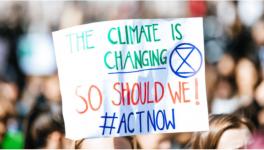As COP27 Summit Starts, Oxfam Says 125 Billionaires Annually Emit 393 MT of CO2e
Representational use only.Image Courtesy: Flickr
As the 27th United Nations Climate Change Conference, more commonly referred to as COP27, kicked off at the Red Sea resort of Sharm el-Sheikh, in Egypt, on Monday, an Oxfam report revealed that the investment made by 125 billionaires who have a collective $2.4 trillion stake in 183 companies is responsible for the emission of 393 million tonnes (MT) of CO2e annually.
According to the report, titled Carbon Billionaires: The investment emissions of World’s richest people, the amount of CO2e emitted by the investment of these billionaires is equivalent to that of France—an annual average of 3 MT of CO2e per person, which is a million times higher than the average 2.76 tonnes of CO2e for those living in the bottom 90%.
The actual figure, the report states, is likely to be higher still as published carbon emissions by corporate entities have been shown to systematically underestimate the true level of carbon impact.
The world’s richest people emit huge and unsustainable amounts of carbon and, unlike ordinary people, 50% to 70% of their emissions result from their investment, the report found. Their investment in polluting industries, such as fossil fuels and cement, is double the average for the Standard & Poor 500 group of companies.
Compared to the majority of society, investment by the richest is the biggest source of CO2e emission—for the top 1%, between 50% to70% of their emissions, Oxfam said. For every million dollars invested by the billionaires, 162.34 tonnes of CO2e are emitted annually. By comparison, for every million dollars invested in a fund that tracks the S&P 500, 86 tonnes of CO2e are emitted.
The report found that 24% of billionaire investment is in the consumer discretionary sector with 18% in consumer staples and 11% in financials. In terms of high-polluting industries, 7% of investment is in energy and another 7% in materials. By comparison, energy corporates make up 4.7% of the S&P 500 and materials 2.5%.
Only 53 out of the 183 corporates in the Oxfam study (29%) are working with the Science-Based Targets initiative and have committed to or have set targets to reduce their emissions in line with climate science while only 29 (16%) have made net zero commitments, the report further stated.
It would take 1.8 million cows to emit the same levels of CO2e as each of these billionaires and almost four million people would have to go vegan to offset the emissions of each of them.
“We need COP27 to expose and change the role that big corporates and their rich investors are playing in profiting from the pollution, which is driving the global climate crisis,” Oxfam GB CEO Danny Sriskandarajah said adding that it is people in low-income countries that have done “the least to cause it who are suffering the most—as we are seeing with the devastating drought in East Africa and the catastrophic floods in Pakistan”.
Asking governments to tackle the problem urgently by “publishing emission figures for the richest people, regulating investors and corporates to slash carbon emissions and taxing wealth and polluting investment”, Sriskandarajah said, “They can’t be allowed to hide or greenwash.”
Slamming these billionaire investors, who are at the “top of the corporate pyramid”, Sriskandarajah said that they have a huge “responsibility for driving climate breakdown”.
“The role of the super-rich in super-charging climate change is rarely discussed. This has to change. They have escaped accountability for too long. To meet the global target of keeping warming below 1.5 degrees Celsius, humanity must significantly reduce carbon emissions. This will mean radical changes in how investors and corporations conduct business, and how policymakers manage both,” Sriskandarajah added.
Often, the high-profile commitments made by corporates do not stand up to scrutiny. The flurry of net zero goals that depend on offsetting is at best a distraction from the need to take short-term measures to reduce emissions by corporates and has the potential to derail climate action, it added.
“These few billionaires together have investment emissions that equal the carbon footprints of entire countries like France, Egypt or Argentina,” said Nafkote Dabi, climate change lead at Oxfam. “The major and growing responsibility of wealthy people for overall emissions is rarely discussed or considered in climate policy-making. This has to change.”
Mentioning how emissions caused by the lifestyle of billionaires, their private jets and yachts are thousands of times more than that of an average person and “already completely unacceptable”, Dabi said, “But if we look at emissions from their investment, then their carbon emissions are over a million times higher.”
In 2021, Oxfam said that using land alone to remove carbon emissions to achieve ‘net zero’ by 2050 would require, at least, 1.6 billion hectares of new forests, an area equivalent to five times the size of India.
A wealth tax on the world’s super-rich, according to Oxfam, could raise $1.4 trillion a year, which could help developing countries—worst hit by the climate crisis—to adapt, address loss and damage and carry out a just transition to renewable energy.
Oxfam India CEO Amitabh Behar called for taxing the super-rich and curbing their polluting investment. “The super-rich need to be taxed and regulated away from polluting investment that are destroying the planet. Governments must also put in place ambitious regulations and policies that compel corporations to be more accountable and transparent in reporting and radically reducing their emissions,” he said.
The report found that if the billionaires in the sample moved their investment to a fund with stronger environmental and social standards, it could reduce the intensity of their emissions by up to four times.
Get the latest reports & analysis with people's perspective on Protests, movements & deep analytical videos, discussions of the current affairs in your Telegram app. Subscribe to NewsClick's Telegram channel & get Real-Time updates on stories, as they get published on our website.
























